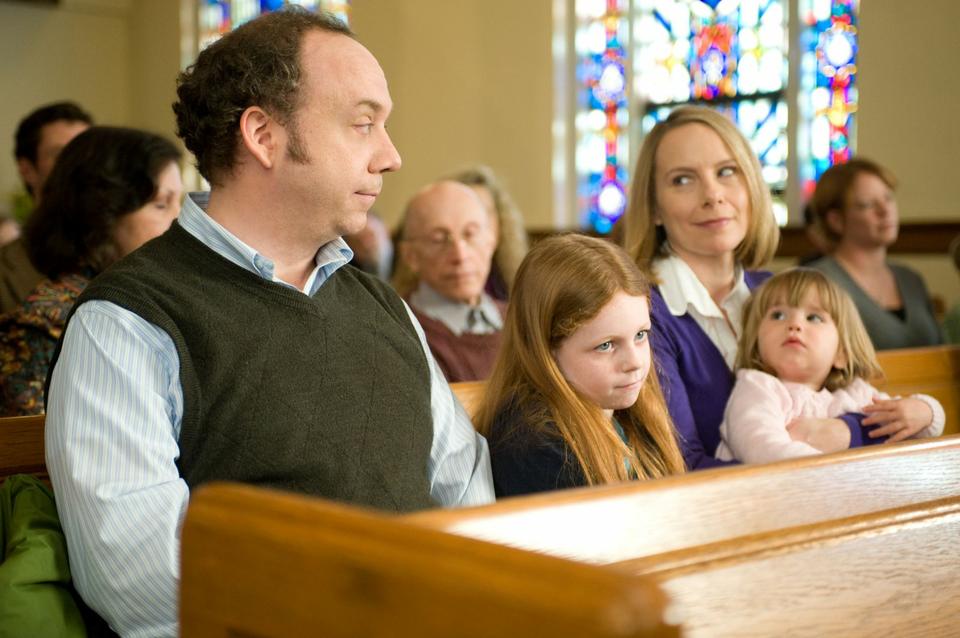
News
News Flash: Memory Shop and Anime Zakka to Open in Harvard Square

News
Harvard Researchers Develop AI-Driven Framework To Study Social Interactions, A Step Forward for Autism Research

News
Harvard Innovation Labs Announces 25 President’s Innovation Challenge Finalists

News
Graduate Student Council To Vote on Meeting Attendance Policy

News
Pop Hits and Politics: At Yardfest, Students Dance to Bedingfield and a Student Band Condemns Trump
McCarthy’s Latest is a ‘Win Win’
Win Win -- Dir. Tom McCarthy (Fox Searchlight) -- 4.5 Stars

“Win Win” is a winner. Actor-turned-filmmaker Tom McCarthy delivers with his third feature, thanks to the superb performances of Hollywood stalwart Paul Giamatti and newcomer Alex Shaffer. An unconventional family drama, the film tugs at the heartstrings while making use of authentic characters and quirky dialogue to avoid the pitfalls of cliché and its story’s occasionally implausible plot points.
Giamatti plays Mike Flaherty, an elder care lawyer who coaches high school wrestling at night. Short on cash, Giamatti commits to becoming the legal guardian of his most wealthy client, Leo—played by the wry and cantankerous Burt Young—after he learns that it will net him an extra $1,500 a month.
Even then, everything seems to be falling apart for Giamatti. In addition to struggling with his law practice and failing wrestling team, he has stress-induced chest pains and a smoking habit. Matters continue to worsen until the arrival of Leo’s 16-year-old grandson Kyle Timmons (Alex Shaffer), a troubled wrestling prodigy trying to escape his drug addict mother (Melanie Lynskey).
“We have kids, Mike, I’m not taking chances with Eminem down there,” Mike’s wife, Jackie (Amy Ryan) says, as Kyle shacks up in the basement. Despite the potential danger of hosting the tattooed teen, the family takes him in. Writer/director Tom McCarthy’s Eminem reference is particularly apt, as Shaffer has said he would listen to the rapper to channel the anger required for Kyle’s character. Like the Flahertys, McCarthy took a leap faith in taking on Shaffer, whose acting resume consisted only of his 6th-grade appearance in Gilbert and Sullivan’s “The Pirates of Penzance.” His lack of dramatic experience, however, is easily balanced by his real-life experience: Shaffer became a New Jersey state wrestling champion just before production for the film began.
Though Shaffer is new to the acting game, he becomes the angsty Kyle effortlessly, forming a “Blind Side”-like bond with Giamatti, whose progression from self-sabotaging lawyer to proud father is both heartwarming and genuine. These performances are crucial, as with a low budget and improbable storyline, “Win Win” is highly dependent upon quality acting—making McCarthy’s casting choices of Giamatti and Shaffer inspired ones.
Candid and authentic supporting characters also drive McCarthy’s writing forward. Giamatti’s quick-witted young daughter (Clare Foley), who opens the movie with a series of profane remarks, and Giamatti’s best friend Terry Delfino’s (Bobby Cannavale) cheating wife and subsequent mid-life crisis both provide much-needed comic relief.
These actors’ genuine delivery on screen can be attributed to McCarthy’s painstaking work habits and devotion to the messages conveyed by his writing and filming. A famed perfectionist, McCarthy is known to agonize over an individual line for hours simply to ensure that it is something that one of his characters would utter in real life. His determination to make the film’s characters perfect—and therefore, imperfect—surfaces throughout “Win Win.” The people in the film feel real, even on those occasions when the story does not.
McCarthy’s careful effort clearly pays off. His third feature project is both surprising and witty, striking the perfect balance between high school sports movie and family drama. It is the rare film that can comingle laughs and an improbable plot with deeper themes of masculinity, familial loyalty, and the responsibilities of parenthood. Refreshing and inspiring, “Win Win” will likely move even those moviegoers who showed up just for the wrestling rush.
Want to keep up with breaking news? Subscribe to our email newsletter.
From Our Advertisers

Over 300+ courses at prestigious colleges and universities in the US and UK are at your disposal.

Where you should have gotten your protein since 1998.

Serve as a proctor for Harvard Summer School (HSS) students, either in the Secondary School Program (SSP), General Program (GP), or Pre-College Program.

With an increasingly competitive Law School admissions process, it's important to understand what makes an applicant stand out.

Welcome to your one-stop gifting destination for men and women—it's like your neighborhood holiday shop, but way cooler.

HUSL seeks to create and empower a community of students who are seeking pathways into the Sports Business Industry.
